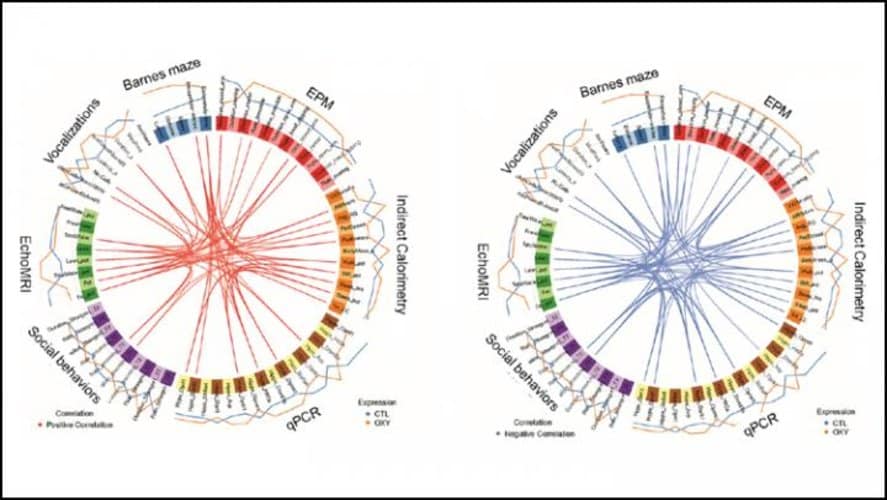Summary: Alterations in long-term social behavior and gene expression were observed in the offspring of mice exposed to pain-killing opioids during pregnancy.
Source: SfN
Mice exposed to the opioid oxycodone before birth experience permanent changes in behavior and gene expression.
The new research published in eNeuro highlights a need to develop safer types of painkillers for pregnant women.
Opioids like oxycodone are prescribed to pregnant women to treat pain, but the drugs may affect the fetus, too. Opioids can pass through the placenta, binding to receptors in the fetal brain, which can lead to opioid withdrawal in newborn babies.
The long-term consequences of prenatal opioid exposure haven’t been fully studied, however.
To explore this, Martin et al. administered oxycodone to female mice every day for the two weeks prior to and throughout the duration of their pregnancy.
The team administered a range of behavioral tests on the offspring during weaning and later in adulthood. The offspring exposed to oxycodone during gestation showed signs of impaired social behaviors and communication. They were also larger and less active than the control mice.

The research team examined the gene expression of opioid receptors in the offspring. In the hippocampus, a region involved in learning and memory, one type of receptor increased in male mice while a different receptor decreased in female mice.
These results reveal prenatal opioid exposure can have lifelong effects on offspring.
About this genetics and neuroscience research news
Source: SfN
Contact: Calli McMurray – SfN
Image: The image is credited to Martin et al., eNeuro 2021
Original Research: Closed access.
“Maternal Oxycodone Treatment Results in Neurobehavioral Disruptions in Mice Offspring” by Rachel E. Martin, Madison T. Green, Jessica A. Kinkade, Robert R. Schmidt, Tess E. Willemse, A. Katrin Schenk, Jiude Mao and Cheryl S. Rosenfeld. eNeuro
Abstract
Maternal Oxycodone Treatment Results in Neurobehavioral Disruptions in Mice Offspring
Opioid drugs are increasingly being prescribed to pregnant women. Such compounds can also bind and activate opioid receptors in the fetal brain, which could lead to long term brain and behavioral disruptions.
We hypothesized that maternal treatment with oxycodone (OXY), the primary opioid at the center of the current crisis, leads to later neurobehavioral disorders and gene expression changes in the hypothalamus and hippocampus of resulting offspring.
Female mice were treated daily with 5 mg OXY/kg or saline solution (Control, CTL) for two weeks prior to breeding and then throughout gestation.
Male and female offspring from both groups were tested with a battery of behavioral and metabolic tests to measure cognition, exploratory-, anxiety-like, voluntary physical activity, and socio-communication behaviors. qPCR analyses were performed for candidate gene expression patterns in the hypothalamus and hippocampus of OXY and CTL derived offspring.
Developmental exposure to OXY caused socio-communication changes that persisted from weaning through adulthood. Such offspring also showed cognitive impairments, reduced voluntary physical activity, and weighed more than CTL counterparts. In the hippocampus, prenatal exposure to OXY caused sex-dependent differences in expression of genes encoding opioid receptors and those involved in 5-HT signaling. OXY exposure induced changes in neuropeptide hormone expression and the epigenetic modulator, Dnmt3a, in the hypothalamus, which could result in epigenetic changes in this brain region.
The findings suggest cause for concern that consumption of OXY by pregnant mothers may result in permanent neurobehavioral changes in their offspring. Further work is needed to determine the potential underpinning epigenetic mechanisms.
Significance Statement
Opioids continue to be one of the most commonly prescribed analgesics, but they are highly addictive. Opioid use disorder (OUD) is a problem in women of child-bearing age. This study used a mouse model to examine whether maternal treatment with oxycodone during pregnancy would lead to long-term neurobehavioral alterations in her offspring.
Results from this study indicate that developmental exposure to oxycodone results in longstanding behavioral impairments and gene expression changes in the brain of mice offspring.
Findings from this study thus suggest potential cause for concern that similar impairments may occur in babies born to mothers with OUD.






